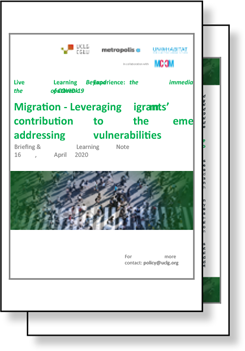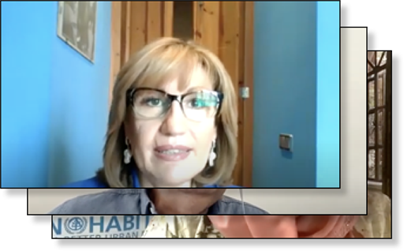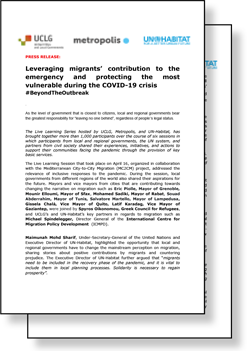Migration
Under-Secretary-General of the United Nations and Executive Director of UN-Habitat:contribution to host communities, fighting prejudices.
Secretary General of UCLG
Mayor of Al-Hoceima and President of UCLG:prejudices.
Mayor of Grenoble.
Mayor of Tunis.
Mayor of Tunis.
Mayor of Sfax.
Vice Mayor of Quito.
UCLG Worl Secretariat
Secretary General
Executive Director UNHabitat
Former Vice Mayor of Athens
Director General of ICMPD
Mayor of Rabat

Re-live the Live Learning
Experience about Migration

Context
Migrants, who account for more than a billion people worldwide, are one of the main drivers of urban growth. Migration policies are often developed at national level, yet cities carry much of the responsibility to ensure their inclusion and their access to housing and public services. Inclusive urban planning can encourage positive contributions of migrant communities to the economic, social and cultural development of cities and ensure that needs of all inhabitants, independent of their legal status, are met. Local Governments have been advocates for a more inclusive approach to migration governance, having established Marrakech Mayoral Declaration in 2018, in which they commit to fulfill the Global Compacts for Migration and Refugees by engaging with all levels of government and with all the actors engaged.
Responses to the COVID-19 pandemic must ensure that safety and protection measures include all urban inhabitants, including migrants. Important efforts need to be made to reduce migrants’ specific vulnerabilities during the outbreak and foster increased recognition of their contribution to host societies.
1B
worldwide
60
in urban areas
Challenges
Vulnerable migrants face serious challenges during the virus outbreak and beyond. In many cases, poor access to health services or to adequate housing conditions hinders their capacity to protect themselves from the virus and to practice social distancing in a safe, healthy environment.
Other relevant challenges include administrative burdens, communication barriers or fake news targeting migrant residents.
Needs
Local governments must ensure that no one, including migrant residents, is left behind in their response to the crisis and beyond. Migrants should benefit from existing policy tools that promote inclusion and access to public basic services. Cities play a key role in implementing migration and asylum policies and need to be ensured enough room for maneuver to guarantee that they are being properly executed.
Responses
Learn how Quito cooperates with local associations and businesses to expand social assistance to migrant residents
Sfax is working with local and international associations to deliver food baskets to vulnerable migrants
Lampedusa is opening up vacant apartments and public facilities to migrant residents
Responses
Learn how Quito cooperates with local associations and businesses to expand social assistance to migrant residents
Sfax is working with local and international associations to deliver food baskets to vulnerable migrants
Lampedusa is opening up vacant apartments and public facilities to migrant residents:
Key Takeaways
- Strengthening a multi-stakeholder governance model is key to build new forms of citizenship and local democracy;
- Civil society organizations hold unique assets to build inclusive strategies targeted at migrant populations at a local level;
- Local and regional governments could leverage on temporary measures to protect migrants and propose permanent policies;
- An evidence-based approach must be promoted to ensure that migrants do not suffer the impact of racist and fake narratives;
- Migrants must have an active role in the debate elaboration of immediate and long-term recovery responses.
Beyond
The Outbreak
Networking and collaboration are, more than ever, essential pillars to foster an inclusive approach to migration. In the political sphere, this calls for enhancing and improving the dialogue between national and local authorities to decentralize the approach towards migration and allow for specific responses to local needs. While migration competences rest with national governments, their impact is local; given that over 60% of migrants live in urban areas, cities need to be more involved when it comes to implementing policies that impact human mobility. From a social perspective, we see examples of how refugee communities are using their collective skills to help during the pandemic. For instance, the Greek Council for Refugees stated how doctors, pharmacists and other skilled professionals are offering to volunteer and help their fellow residents.

Building
Back Better
The UCLG Decalogue

Resources

For further information on the topic of Migration and its impact in cities and regions, please refer to the related resources included below.
- UCLG Manifesto “The Future of Migration”
- MC2CM Project Policy Recommendations “Urban Challenges and Opportunities for the Mediterranean Region”
- UCLG-CSIPDHR “Global Charter-Agenda for Human Rights in the City”
- GPR2C communiqué “The Right to the City Facing COVID-19”
- MC2CM COVID-19 study – ‘Going the (Social) Distance: How migrant and refugee-sensitive urban COVID-19 responses contribute to the realization of the Global Compacts for Migration and Refugees’
- Public Service International’s statement: “Racism and xenophobia are a danger to public health”
- Mayors Migration Council‘s Live Resource Guide: Municipal Migrant & Refugee Sensitive COVID-19 Responses
- Global Exchange on Migration & Diversity’s Migrants with Irregular Status in Europe: Guidance for Municipalities (2019).



